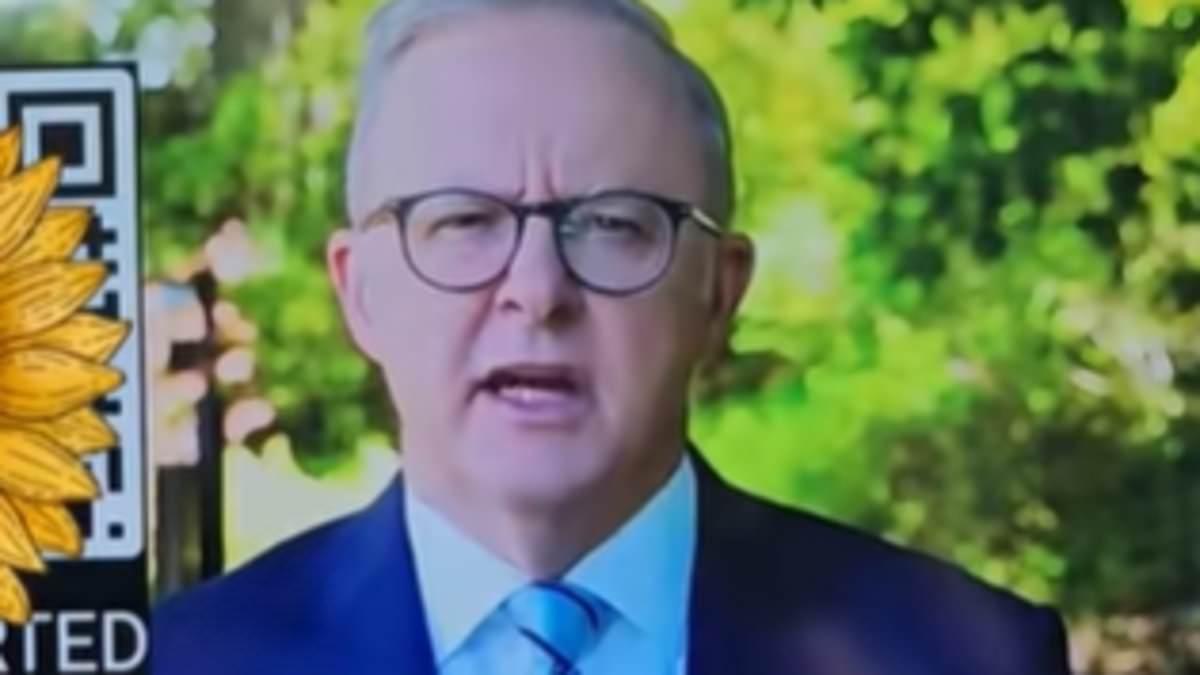Anthony Albanese has promised Aussies ‘financial freedom’ in an AI-generated deepfake video spruiking a dubious investment scheme.
‘Registration takes just a few minutes, submit an application, get a free consultation, invest, and watch the system earn for you,’ the fake Prime Minister says in the clip.
The Albanese clone claims those who follow the QR code in the video can start earning up to ‘$25,000 a month’ trading cryptocurrency.
‘Greetings. From the first day I became prime minister, I wanted to improve the tax system. We will not fully get rid of taxes, of course, but any resident will be able to receive dividends from them,’ Albanese says, according to the scam transcript.
While the voice sounded somewhat like the prime minister, certain words were robotic and spoken with an American accent.
Assistant Treasurer and Minister for Financial Services Daniel Mulino urged social media giants to take stronger action against deepfake scams, warning that platforms like YouTube are not doing enough to stop the spread of criminal content.
Mulino pointed to the federal government’s significant investment in scam prevention, noting that more than $180million had already been committed to combat fraud and online deception.
‘We’ve introduced legislation that will require social media companies, banks and telcos to do much more to stop scammers, or face penalties of up to $50 million,’ Mr Mulino added.
It’s not the first time high-profile ns have been targeted by deepfake scams.
In 2023, n entrepreneur Dick Smith launched a blistering attack on tech giant Meta after his image was used by scammers.
He accused the social media giant of enabling criminal groups to exploit ns through deepfake scam ads across Facebook and Instagram.
‘It’s completely fake. These deepfakes are being used to trick everyday ns into giving up their hard-earned money,’ Mr Smith said.
‘The greed is so great, they’re running ads from criminal organisations. ns have already lost millions.’
Meanwhile, one of ‘s richest people, Andrew Forrest, is suing Meta for hosting ads using his likeness in fraudulent Facebook cryptocurrency ads.
In March, it was revealed there were about 230,000 fake ads using Mr Forrest’s likeness spread across the company’s platforms.
Despite a reported 25.9 per cent drop in scam losses between 2023 and 2024, ns still lost an estimated $2billion last year, according to data from the National Anti-Scam Centre.
Deputy Chair of the n Competition and Consumer Commission (ACCC), Catriona Lowe, has urged ns to be vigilant against deepfakes.
‘Scammers are creating fake news articles and deepfake videos to convince people that celebrities and well-known public figures are making huge sums of money using online investment trading platforms,’ Ms Lowe said.
‘In fact, it is a scam.’
Meta’s independent Oversight Board slammed the company in June for failing to do enough to stop AI deepfake scams featuring high-profile individuals and celebrities.
The board found Meta is letting ‘significant’ amounts of scam content slip through because its content reviewers lack the authority and training to act on fake personas or manipulated videos.
The case involved a deepfake ad of Brazilian soccer legend Ronaldo Nazário promoting a gambling app, which remained online even after being reported over 50 times.
In response, Meta disputed the board’s findings, claiming many were ‘inaccurate’, and that facial recognition technology was being used to combat celebrity scams.
Daily Mail has contacted Google and Mr Albanese’s office for comment.
